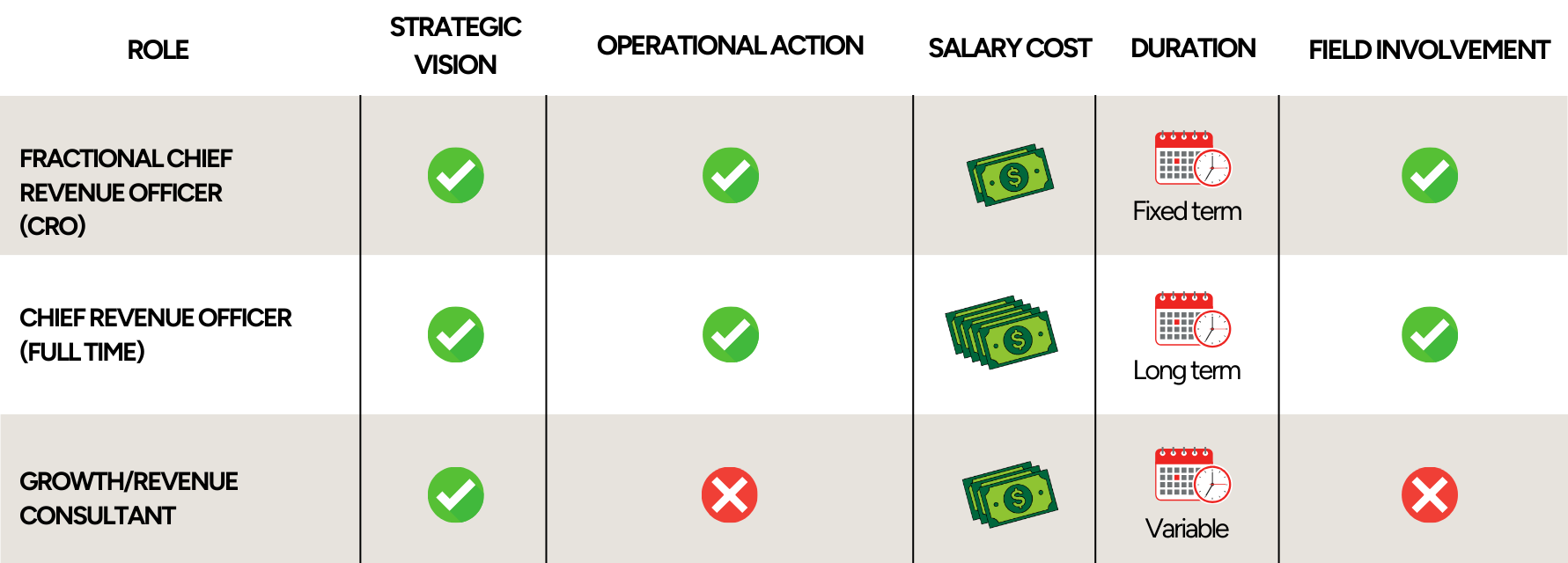What is a Fractional Chief Revenue Officer? Key Role and Responsibilities

Stagnant growth, teams pulling in opposite directions, decisions made without clear data... Does this sound familiar? You're not alone.
According to a McKinsey study (2023), companies that structure their revenue management through a dedicated role achieve growth 1.8 times faster than those that do not. But this strategic role, the Chief Revenue Officer, doesn't need to be full-time to have an impact.
This is where the Fractional Chief Revenue Officer comes in.
At the intersection of strategy, sales, marketing and customer experience, it acts as a revenue conductor. And in a context of growth, repositioning or transformation, it becomes an essential lever.
What is a Fractional Chief Revenue Officer?
The Fractional Chief Revenue Officer is an experienced professional who joins the company for a defined period, with a clear mandate: to structure, align and grow the organization's overall revenue. Unlike a simple consultant, they don't limit themselves to diagnostics or advice. They get involved in operations, integrate into your teams and take direct responsibility for the levers that influence your revenue: sales, marketing, business development and loyalty.
It's a management role, without permanent hiring.
It acts as a revenue conductor, without burdening your internal structure. You benefit from its strategic expertise, its external perspective and its efficient execution, without having to create a full-time position or internalize immediately.
His role is also to establish a method. A system. A structure that holds, even once he's gone.
Fractional CRO, Full-Time CRO or Consultant: What is the Concrete Difference?
At first glance, these three roles may seem similar. But when it comes to structuring the company's revenue, their impact and involvement vary greatly.
The Fractional Chief Revenue Officer (CRO)
- Clear mandate, defined duration (a few months to a year)
- Strategic operational intervention
- Works deeply within your organization without increasing the payroll
- Provides methods, tools, structure
- Implements a system that stays after he leaves
- Controlled cost, without bonuses, benefits or complex hiring process
He acts as a temporary executive, but commits to the results as if he were part of the team.
The full-time Chief Revenue Officer
- Permanent employee, often with a high salary bonus shares
- Suitable for large companies or already highly structured organizations
- Long recruitment and integration process
- Good choice if the company has a complete team and strong commercial maturity
It is a key role, but not always suitable for SMEs undergoing transformation or rapid growth.
The Growth/Revenue Consultant
- Analyzes and recommends, often through audits or reports
- Does not intervene directly in operations
- Assumes no responsibility for implementation
- Little or no field involvement
Useful for obtaining a one-off external perspective, but not sufficient if you are looking for concrete results in the short and medium term.
In summary

When to call on a Fractional Chief Revenue Officer?
There is no "perfect" time. But there are clear signs that it's time to stop managing everything in silos, by intuition or without a method.
Here are the most common situations where our clients decide to integrate a Fractional Chief Revenue Officer:
Your growth is stagnating, despite your efforts
You've invested in marketing and recruited salespeople, but the results are uneven. You feel there's a lack of an overall structure to orchestrate efforts and turn intent into results.
You are entering a new phase
New product, new market, strategic repositioning:
You need an outside eye to structure the growth before it overtakes you.
Your data is scattered… or unused
You have a CRM, marketing reports, dashboards, but no consolidated vision.
You need someone who can turn that data into clear decisions.
Your teams are working hard, but not together
Marketing generates leads that don't close.
Sales doesn't understand priorities.
Customer service discovers promises after signing.
There needs to be a central point. A direction. An alignment.
You yourself
prepare to grow quickly
You don't want to wing it.
You want your foundations to be solid:
- Sales process
- Performance monitoring
- Customer experience
- Predictable action plan
An external Chief Revenue Officer helps you build a machine that handles growth without collapsing.
You don't have a revenue department, but you want to act like you do
Because you aim higher. Because you're strategic. And because you know your business deserves a structure that matches its ambition.
12 concrete responsibilities of the Fractional Chief Revenue Officer
1. Develop a coherent (and achievable) revenue strategy
No more isolated actions and unclear objectives. The Fractional Chief Revenue Officer defines an integrated strategy that aligns sales, marketing, customer service and product around clear, measurable and realistic revenue objectives.
Ex.: Redefine priority targets, reposition the offer, structure a 12-month growth roadmap.

2. Break down silos between sales, marketing and customer service
Too many teams work “in parallel,” but never together. The Fractional Chief Revenue Officer synchronizes all revenue stakeholders around shared processes, common KPIs and a culture of collaboration.
Ex: Coordinate marketing lead generation with sales follow-ups and customer service feedback.

3. Diagnose (then optimize) your sales cycle
The Fractional Chief Revenue Officer analyzes the pipeline, conversion rates, decision cycles, etc. and identifies where opportunities are being lost. Then he structures a clear, reproducible and managed sales process.
Ex.: Formalize the sales steps, equip the sellers, integrate an efficient CRM.

4. Improve lead-to-customer conversion
There's no need to generate more leads if you can't convert the ones you have. The Fractional Chief Revenue Officer works on the purchasing experience: message, social proof, timing, follow-ups, offers.
Ex: Implement lead scoring, create an automated follow-up playbook, better segment messages.

5. Structure (or revise) pricing
A poorly positioned offering can hinder growth. The Fractional Chief Revenue Officer challenges your revenue model, analyzes the perceived value and proposes pricing aligned with your customers and your market.
Ex: Create levels, rethink perceived value, test subscription or performance models.

6. Organize monitoring of commercial performance
Without data, we're flying blind. The Fractional Chief Revenue Officer sets up a clear dashboard with the right indicators to manage your revenue in real time.
Ex: Lead tracking, closing ratio, customer lifetime value, churn rate, monthly forecast.

7. Implement effective growth tools
The Fractional Chief Revenue Officer chooses, implements and connects the right tools: CRM, marketing automation, tracking. Not for the sake of tech, but to accelerate your sales.
Ex: Integrate HubSpot with automated sequences and a shared pipeline with customer service.

8. Structure the sales team (and help it perform)
The Fractional Chief Revenue Officer assesses talent, roles and coaching needs. He or she creates the conditions for salespeople to perform, without recruiting too quickly or burning internal resources.
Ex.: Redefine roles (BDR vs AE), set up an objectives grid, review the commission structure.

9. Create executive alignment around revenue
If the CEO, marketing and sales don't have the same understanding of priorities, growth stalls. The Fractional Chief Revenue Officer acts as a strategic unification point and facilitates aligned decisions.
Ex: Co-facilitate steering committees with key leaders and monthly performance reviews.

10. Drive retention and growth of existing accounts
Too many companies focus on acquisition. The Fractional Chief Revenue Officer establishes loyalty, upsell and customer feedback loops to maximize LTV (lifetime value).
Ex: Customer success program, automated upsell campaigns, strategic NPS (net promoter score) surveys.

11. Manage entry into new markets
If you want to expand your offer or your territory, the Fractional Chief Revenue Officer supports you with a structured approach: analysis, go-to-market, execution.
Example: Expansion into a new province or a new B2B segment with a tested strategy and measurable results.
12. Prepare for growth… and make it sustainable
The Fractional Chief Revenue Officer isn't there to "patch up" a difficult month. Their role is to build a healthy, predictable growth system that lasts over the long term.
E.g.: 12–18 month growth plan, standardization of processes, training of internal leaders to take over.

How to successfully integrate an Fractional Chief Revenue Officer into your organization
An external Chief Revenue Officer isn't a parachuted-in savior. They're a strategic partner. And like any partner, their impact depends on the quality of their integration.
Here are the winning conditions for maximizing your contribution from the first few weeks.
Clarify your expectations from the start
An external Chief Revenue Officer is not there "to see what he can do." Even before he arrives, you should clearly define your growth priorities, your current challenges and your targets.
This doesn't mean having everything solved, but having an ambitious and shared vision is essential to framing it well. Acts as a temporary executive, but commits to the results as if he were part of the team.
Give him access to the big picture
The Fractional Chief Revenue Officer must quickly understand your customers, your offers, your processes and your data. The faster he or she accesses the reality on the ground, the faster he or she can propose concrete actions.
DETA advice: share your tools, dashboards, CRM accounts, marketing results, offers, sales documentation, etc. with them upon onboarding.
Make him a team member, not an outside consultant
The Fractional Chief Revenue Officer doesn't operate on a one-off basis. He or she integrates into your routines, your meetings and your executive decisions. He or she collaborates with your leaders in marketing, sales, operations and more.
E.g.: Include him in weekly management meetings, schedule frequent check-ins for the first 30 days, give him access to internal tools (Slack, Notion, HubSpot, etc.).
Give him latitude... but also points of friction
A good Fractional Chief Revenue Officer doesn't try to please. He challenges, questions, proposes and refocuses. Give him the space to question what already exists, but also give him clear constraints: culture, budgetary limits, internal realities.
It is in this balance that a real realistic growth strategy is born.
Frame with clear (but not rigid) indicators
The impact of an external Chief Revenue Officer must be measurable, but not just in immediate dollars.
We are talking here about:
- Strategic clarity restored
- I got Pipeline plus
- Best conversion
- Inter-team alignment
- Better predictability
DETA Tip: Define KPIs by phase: clarity within 30 days, first quick wins at 60 days, structured plan at 90 days, performance at 120 days.
There is no "perfect" time. But there are clear signs that it's time to stop managing everything in silos, by intuition, or without a method.
Here are the most common situations where our clients decide to integrate an external Revenue Director:
Why DETA is proposing this role as a strategic lever
At DETA, we've seen one thing come up again and again with our clients: the desire to grow is there... but the alignment to get there is lacking.
Not a lack of talent. Not a lack of motivation. But a lack of clarity on the revenue strategy.

SMEs don't need more execution... they need direction
We saw companies:
- multiply marketing tactics unrelated to sales,
- hire salespeople… without a process,
- launch campaigns… without a clear objective.
The role of Fractional Chief Revenue Officer exists for precisely this: to refocus, align, bridge silos and ensure that every action contributes to growth.
A hybrid role,
up to the challenges
of today
We're not talking about a simple consultant here. We're talking about a growth leader who can be integrated into your team and is capable of:
- understand your business reality,
- speak to shareholders as well as to operational staff,
- challenge the strategy as much as optimize the execution.
This is exactly what DETA offers: experienced, part-time Fractional Chief Revenue Officer, perfectly suited to the reality of ambitious SMEs who want to move up a gear without exploding their fixed costs.
Offering an external Chief Revenue Officer is offering an acceleration ramp
Our mission at DETA is to put the right minds in the right place at the right time. And too often, that "right time" comes just before growth plateaus... or demotivation sets in.
The Fractional Chief Revenue Officer then becomes the catalyst:
- of the repositioning of an offer,
- of the professionalization of sales,
- of the structuring of a profitable growth model.
Your growth deserves a real driver
You already have the ambition. You have the resources. What you may be missing is a clear, cross-functional, revenue-focused direction.
An external Chief Revenue Officer is the strategic piece you've been missing to align your efforts, structure your levers and propel your business into its next phase of growth.
It's not a luxury reserved for large companies. It's a smart investment for SMEs that want to grow methodically, not by accident.
Ready to structure your growth?
At DETA, we believe that local SMEs deserve agile access to high-level expertise. And that's exactly what our Fractional Chief Revenue Officer offer you.
Want to see if this role is right for you? Schedule a no-obligation exploratory call with our team, just to get a clearer picture.




